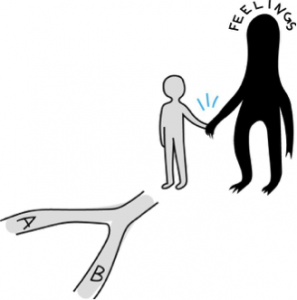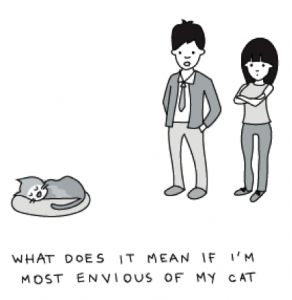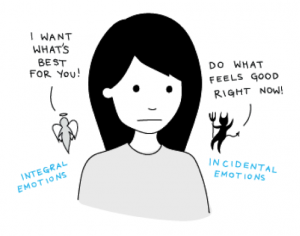There’s a science to listening to your gut. When you make decisions, you tend to think of rational analysis as straightforward, and gut feelings as disingenuous. But the reason emotions get a bad reputation is that you probably don’t know how to decode them. Emotions aren’t mystical signals; they come from expertise, experience, and rapid information processing. We spent the last three years studying the science of emotions–and their intersection with our lives at work–for our new book, No Hard Feelings: Emotions At Work (And How They Help You Succeed).
The two types of emotions

Integral emotions are directly tied to the choice you’re facing. For example, if you’re trying to decide whether or not to ask for a promotion, and the idea of not asking fills you with regret, that feeling is an integral emotion. Incidental emotions are unrelated to the decision at hand, but they like to stick their tentacles into your reasoning. Say Liz stubs her toe or gets a speeding ticket. She might then get upset and suddenly decide that her colleagues’ ideas are all bad.
Envy and regret are two common integral emotions, and sadness and anger are two common incidental emotions. Below, we’ll look at how they affect your decision-making, and how you should respond to each emotion.
Envy (integral emotion)

Envy reveals your values–if you’re honest with yourself, that is. Most of us are ashamed when we’re envious because it implies the other person is better at something than we are. So next time you covet what someone else has, don’t perform all kinds of mental gymnastics to convince yourself you feel nothing. Admit it might be a sign that you need to improve or make a change and focus on what you can do to get the outcome you want.
Regret (integral emotion)
Psychologists Daniel (Danny) Kahneman and Amos Tversky found that of all emotions, people try hardest to avoid regret. “When people asked Amos how he made the big decisions in his life, he often told them that his strategy was to imagine what he would come to regret, after he had chosen some option, and to choose the option that would make him feel the least regret,” writes Michael Lewis in The Undoing Project. “Danny, for his part, personified regret. Danny would resist a change to his airline reservations, even when the change made his life a lot easier because he imagined the regret he would feel if the change led to some disaster.”

Sadness (incidental emotion)
When you’re sad, you see the glass as half empty. Emotional funks make you overestimate the chances of something terrible happening to you. You also set lower expectations for yourself and are more likely to pick the option that gives you something now instead of tomorrow.
Gratitude has the opposite effect of sadness. When you’re feeling down, list three things that make you grateful. To boost your mood, write and personally deliver a gratitude letter to someone you’ve never thanked for their kindness. Compared to other happiness interventions, this simple act provides the most significant and most prolonged boost to happiness–the benefits can last for over a month.
Anger (incidental emotion)
Anger makes you hot-headed, drives you to pick long shots over safe bet, succumb to stereotypes, and makes you less willing to listen to advice.
If you’re Warren Buffett, your anger can cost you $100 billion. In 1964, Berkshire Hathaway was a struggling textile manufacturer. Buffett, already an affluent investor, knew the company was in trouble but still thought its shares were underpriced. He bought into Berkshire expecting to soon sell his stake back to then-CEO Seabury Stanton for a quick profit. But when Stanton offered him less than they had initially agreed on, Buffett saw red. Instead of accepting a slightly smaller profit, he launched a year-long takeover campaign, buying more and more shares until he had the right to fire Stanton. Because of this decision, Buffett spent the next two decades pouring money into the failing textile company–before giving up. If he had spent the money on a better investment, Berkshire Hathaway could have been worth $100 billion more than it is today.
So next time you’re angry, slow down, take a breath, and don’t be so quick to shrug off what other people say. Question your gut reaction–because it’s probably not coming from a place of rationality. It might be hard in the moment, but your future self will thank you when you realize that you avoided a costly mistake.
Liz Fosslien and Mollie West Duffy are the authors of No Hard Feelings: The Secret Power of Embracing Emotions at Work. You can subscribe to their monthly newsletter, and for more of their hilariously accurate cartoons, follow them on Instagram here.
Recognize your brand’s excellence by applying to this year’s Brands That Matter Awards before the early-rate deadline, May 3.
